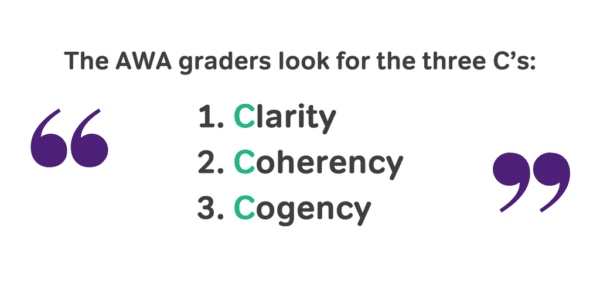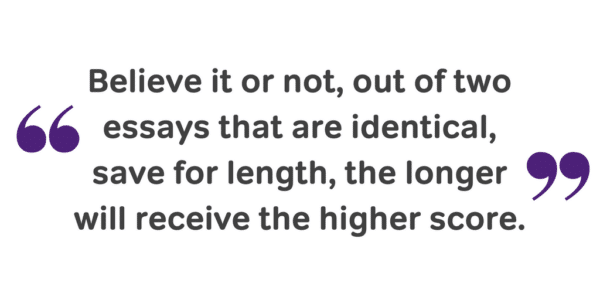

Though the GRE used to have two essay questions on the Analytical Writing section (prior to 2024), nowadays there’s only one GRE essay. That means the original Argument Essay no longer exists, and the only thing you need to write is the Issue Essay. Great news! So, how do you prepare for the new GRE essay? Read on to find out.
The GRE essay is a 30-minute task which requires reading an opinion of an issue and then crafting a well-supported argument. The GRE essay not only tests your ability to form a cogent thesis statement but also how well you defend your position over the course of several paragraphs. The clarity and organization of your writing also factor into your final score.
The GRE essay is also known as the Issue Task because you have to analyze a provided issue. What kinds of issues will you be asked to write about? The topics generally fall under categories such as education, technology, art, society, government, philosophy, and more. The following example prompt belongs to the technology category.
Prompt: It could be argued that the most important technological breakthroughs have happened by chance and through surprise discoveries. However, others argue that deliberate, well-planned research with specific goals is the only way to ensure technological advancement.
Instructions: Write a response in which you discuss the extent to which you agree or disagree with the statement and explain your reasoning for the position you take. In developing and supporting your position, you should consider ways in which the statement might or might not hold true and explain how these considerations shape your position
ETS (the makers of the GRE) publishes the entire pools of Issue topics on its website. The topics you see on your exam will be drawn from those pools, so this is an essential resource.
The GRE Essay is scored on a scale from 0 to 6. This score is separate from and does not factor into your overall GRE scaled score (which considers only your performance on the math and verbal sections).
The majority of test takers end up with a score between 3.0 and 5.0. You can see the exact percentiles here in this article: GRE Score Percentiles – What Does Your Score Mean for You?
What exactly do those scores mean? Any essay scored a 2 or below has serious flaws. An essay that receives a 4 is adequate. And the rare essay that gets a 6 is truly outstanding. You can read more about each score level in ETS’s article on GRE Analytical Writing Scoring.
Note that your final GRE Analytical Writing section score is really the averaged score of two graders: a human grader and an AI grader. The human essay grader takes around 30 seconds to grade an essay. He or she scans to make sure that you have clearly organized your information, and that your paragraphs start with a topic sentence and flow into specific examples that support your analysis. The grader looks to make sure you have a conclusion that articulates what you’ve already stated. He or she gives you a score and they move on to the next essay.
And if for some reason the human and AI greatly disagree, a 2nd human is brought in to score your essay instead.
The graders look for the three C’s: clarity, coherency, and cogency.
First off, you must express your ideas in a clear manner. If you jumble your words, or simply throw in unnecessary words, doing so compromises clarity. But your essay is not just one sentence with a clearly expressed idea; it is a set of ideas that should logically connect to one another. That is coherency.
Next you want to provide convincing evidence to back up your thesis. You can throw in some vague example, but doing so means your essay will probably lack cogency. Develop an example that cogently reinforces your thesis is key to a high essay score.
There are some other factors that play into the human grader’s assessment of a GRE essay. Style is important; an essay with choppy sentences and unsophisticated vocabulary will be awarded a lower score, all other things being equal, than an essay with mature syntactical development and GRE-level vocabulary deployed felicitously.
There is also the issue of grammar. Even though the graders don’t set out to nitpick at grammar, as soon as you make the tiniest mistake, he or she will notice. Anything from improper use of pronouns to misspelling common words can negatively impact your score. At the same time, a grammatical flub or two won’t preclude an essay from getting a perfect score, as long as everything else about the essay is top-notch.

By simply writing often you will be able to write with greater command and facility. With diligent practice, words will not seem submerged deep in your subconscious but will instead spring to life on the page.
You must think about what you are going to write before you write. I’m sure many amongst you subscribe to the school of thought that if you write, they will come: the words, the compelling examples, and the nuanced logic. When practicing for the GRE essay, you must avoid this tendency and instead spend a few minutes coming up with a roadmap (either in your head or on the computer screen). At first this step will slow you down and you will want to go back to the old method. Be patient. Once you become adept at outlining, the essay will write itself.
Though you won’t get much of an opportunity to edit your essay on test day, sedulously editing your practice essays will make you more aware of your mistakes, both grammatical and logical. Correcting these mistakes will not only help you anticipate them in the future, but will also make the writing and logic in your future essays clearer.
By reading other students’ essays, you will develop a sense of what ETS is looking for. You’ll also be able to better judge your own essays. Throughout practice sessions, you should keep tweaking your essays, so they get closer and closer to the next score up. So, if you started at a ‘3’, focus on getting to a ‘4.’
ETS explicitly states that it is looking for the quality and clarity of thought and not grammar per se. Yet the two are closely related. If you struggle to articulate something—and in doing so break a grammatical rule (or three!)—you will sacrifice clarity. Even minor grammatical errors (faulty pronouns, subject/verb agreement) will mar the overall quality of your writing.
Between grammar and style, grammar is much easier to improve. Great style is much more elusive. Indeed, many writers have cultivated their prose style over years of assiduous practice. Rest assured though—to score well on the GRE your prose does not have to be fit for The New York Times. You do want to avoid choppy sentences by varying up your sentence structure. And you shouldn’t be averse to trading a simple word for a more complex one as long that word is appropriate for the context.
A great book that offers writing advice, from dangling modifiers to how to construct compelling, dynamic sentences, is William Zinsser’s On Writing Well.
For a more stern approach to writing, Strunk and White’s Elements of Style has helped students for over half a century.
The only reason I mention both of these books is they focus not only grammar but also on style. Many grammar books should suffice as far as grammar goes, but they fall short on teaching writing style, which is a great skill to have for the GRE (and beyond!).
It is one thing to read the guidelines for what constitutes a ‘6’ essay on the GRE Analytical Writing section. In essence, you are just interpreting the information. But by actually reading real essays, you learn what the graders are looking for.
The best source for sample essays are the released sample essays (completed with grader comments!) from ETS. The essays here are actual student essays. Use these essays to assess your own level of writing. In other words, determine where in the 0.0 – 6.0 range you fall, based on the scores given to the other essays.
Additionally, you can see sample GRE essays from Magoosh students along with our own commentary here: GRE Issue Essay: Strategies + 8 Real Student Essays with Scores
Believe it or not, out of two GRE essays that are identical, save for length, the longer will receive the higher score. That doesn’t mean you should frantically scribble away, hoping that a seven-paragraph essay will automatically confer the much coveted ‘6’. Substance matters greatly. But as long as all the parts of your essay are there, you should shoot for a five-paragraph essay: an intro, three body paragraphs, and a conclusion.
I should also point out that paragraph length matters, too. 5 two-sentence paragraphs is not really a long essay. And, of course, don’t forget that each of those paragraphs has to flow logically and clearly from your thesis.

While there is no better teacher than feedback, having someone give you an honest critique of your essay is difficult. ETS offers a service to score your practice GRE essays, but that’s all you will get. Just a score, no feedback.
Over the years, I’ve seen many students asking for feedback on forums—such as The GradCafe or Reddit—and sometimes munificent souls (usually GRE test takers with strong writing skills) provide insightful analysis. While that may not sound all that reassuring, remember that this feedback is free of charge and there really isn’t much else out there in terms of essay feedback.
To take advantage of the latest technology, you can now sign up for Magoosh Premium Plan today to access our AI Expert Tutor that will grade your essay and give pointers on how to improve your score!
Lastly, you yourself will want to critique your essays. Magoosh as a downloadable GRE essay rubric for you to use. And for even more writing tips, check out 12 Tips to Ace GRE Writing.
Chris graduated from UCLA with a BA in Psychology and has 20 years of experience in the test prep industry. He’s been quoted as a subject expert in many publications, including US News, GMAC, and Business Because. View all posts